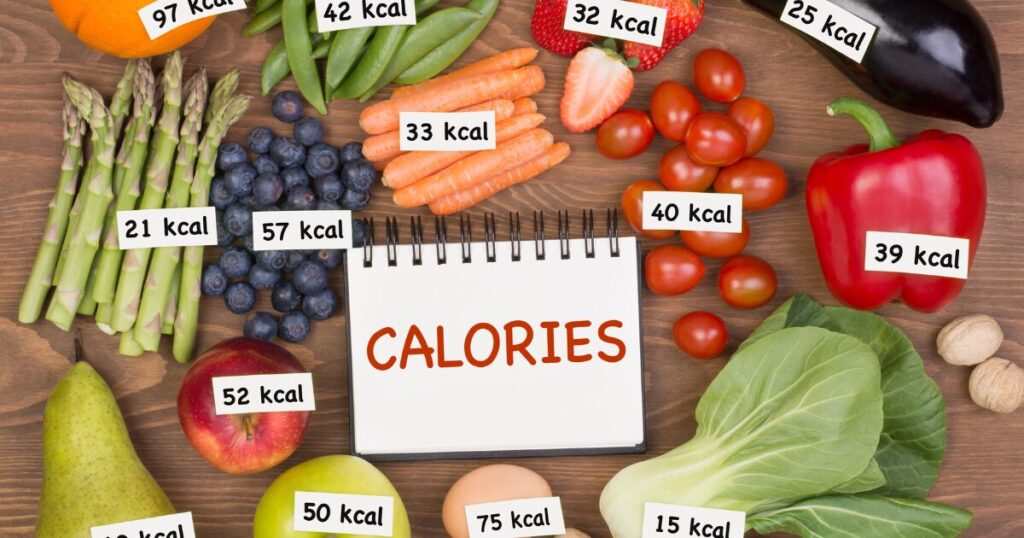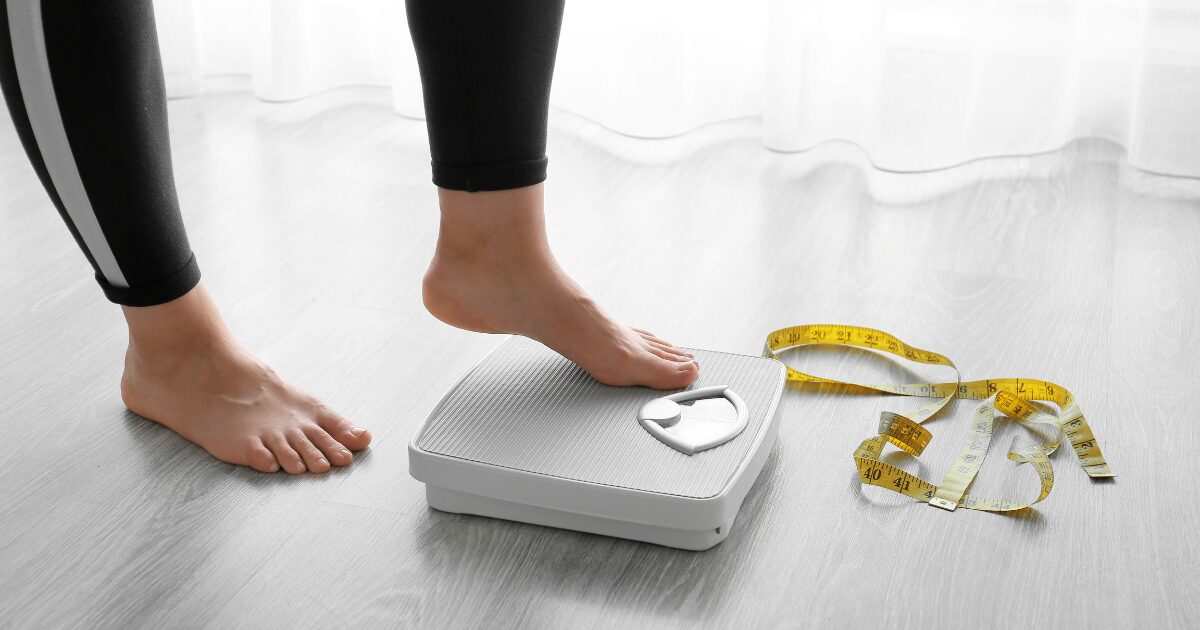You might have practised several physical activities to burn extra calories and lose weight. But it’s frustrating when all your efforts are wasted, and your weight is not falling even after doing everything. You may be thinking, “Why am I gaining weight in a calorie deficit?
So, you need to consider that limiting calorie intake and burning more calories is not the only thing that will contribute to weight loss. However, other factors will contribute to weight gain, too. So, let me give you the overall view on which things affect your weight loss efforts and what you need to do to stop weight gain.
What is a Calorie Deficit?
When you limit your calorie intake and start burning more calories, the situation is a calorie deficit. When we eat anything, our body uses the required calories and stores others as fat and carbohydrates for later use. When you continuously take in more calories than your body needs, it stores more fat, and, as a result, you gain weight.
A calorie deficit is a solution in which you consume fewer calories and burn more through physical activity.
There are two ways to do it: first, by taking foods that contain fewer calories, and second, by maximising physical activity to burn more calories. If you combine both of these approaches, you can maximise the results.

7 Reasons Why You Are Not Losing Weight on Calorie Deficit?
Only limiting calorie intake can’t help you lose weight. There are many other factors that you need to address for effective results. Here are 7 main reasons that might be a barrier in your weight loss journey:
Reason 1: Underestimating Calorie Intake
Most people gain weight due to careless calorie intake, even with a calorie deficit. You might think you have to consume fewer calories, but when you start eating, your little miss calculation increases and adds more calories to your food than you think.
It’s easy to think it will be a little tricky while implementing. For example, when eating food, a little cheese sprinkle or cream in the coffee can double or triple the calories. The same case is with cooking oils. They contain a high number of calories. 1 tablespoon of olive oil contains almost 120 calories. Then, you can consider how these oils contribute to your calorie deficit.
Tips for Accurate Calorie Tracking
So, how can you avoid underestimating your calorie intake? The key is accurate tracking. You can start by investing in a good food scale. Weighing your food correctly rather than guessing will give you a better idea of what you eat.
Secondly, build a habit of reading nutritional charts of different foods. You also need to pay close attention to the portions you are taking. It’s best to use the small plates that you can take less.
Another option is calorie tracking apps, which were recently added, but they can help you a lot. They keep track of everything you consume, including those sneaky hidden calories. Some apps allow you to scan barcodes, making it easier to log your food and ensure you stay within your calorie goals.

Reason 2: Overestimating Calorie Burn from Exercise
Another common problem is overestimating the calorie burn. Now, many people expect more calories than they burn. As a result, they eat without considering their calorie intake because they do more physical exercise.
But you must understand that an hour of moderate-intensity exercise like cycling or jogging can burn 300-500 calories. And If you are taking a piece of cake or a big plate of pasta, the number of calories will be as high as you have burned in that 1 hour.
Many people use fitness trackers, and they can contribute to this overestimation. These devices often overestimate calorie burn, sometimes by 20-30%. The problem is that they don’t account for individual differences in metabolism, exercise intensity, or even the type of workout you’re doing.
How to Avoid It?
To avoid this, setting realistic expectations for your exercise routine is essential. Remember, exercise is just one part of the weight loss equation. Pairing it with mindful eating and realistic calorie tracking is necessary to achieve your goals.
You must maintain your calorie intake even when doing physical activities. You can also add more calorie-burning activities to your daily routine, like walking while on a call, taking the stairs, etc.
Reason 3: Hormonal Imbalances
Hormones play a vital role in your weight management. Few hormones in our body directly affect weight. Let’s see how they are relevant to each other:
Insulin: The Fat-Storage Hormone
Insulin is a hormone produced in the pancreas to maintain blood sugar levels. Your blood sugar rises when you eat something, and the pancreas releases hormones. This hormone helps to absorb glucose from the bloodstream, using it as energy or storing it as fat.
However, when your insulin level remains consistently high, the body stores more fat and as a result, you start gaining even with a calorie deficit.
Cortisol: The Stress Hormone
Cortisol is also known as a stress hormone produced by the adrenal gland. It’s released in response to stress and plays a role in bodily functions, including metabolism and the immune response. It is necessary for survival, but chronic stress can lead to increased cortisol, which can negatively impact your weight.
When the cortisol level is high, your body will start storing more fat, specifically around the abdominal area. This is because cortisol triggers the body to release glucose into the bloodstream for a quick energy boost, and this energy is stored as fat.
High cortisol levels can also increase your hunger for high-calorie foods, making it challenging to stick to your calorie deficit. So, you should test your cortisol level for chronic stress. The average cortisol level is between 6-23 micrograms per deciliter.
Thyroid Hormones: The Metabolic Regulators
This gland in your neck produces hormones that regulate your metabolism. The main hormones are triiodothyronine (T3) and thyroxine (T4). These hormones control how quickly your body uses energy and how sensitive your body is to other hormones. When your thyroid is functioning correctly, it will maintain a healthy metabolism.
In hypothyroidism, the thyroid gland doesn’t produce enough hormones. It can slow down your metabolism. It means your body burns fewer calories at rest, making it harder to lose weight even if you’re eating less. Symptoms of hypothyroidism include cold intolerance, fatigue, and unexplained weight gain.
How to Balance Hormonal Weight Gain?
If you notice that you are gaining weight due to hormonal imbalance, you should go with the tests. That’s not a matter that you can adjust to. So, you should consult with your healthcare provider immediately. He can conduct tests and advise you on what treatment you need.

Reason 4: Water Retention
Water retention might be a reason if you continuously gain weight, even if you have a calorie deficit and are exercising. It is when excess fluid builds up in your body’s tissues, and several factors can trigger it. One of the most common causes is high sodium intake. When you take a lot of salt, your body holds onto extra water to dilute the sodium in your bloodstream. Stress is another major factor.
Stress can be another significant factor. When you get stressed, your body releases a hormone named cortisol, which can cause your body to retain water. This is a natural response, but losing weight can be frustrating.
Menstrual cycles can also play a significant role in water retention for women. Hormonal fluctuations during your periods can lead to holding more water, leading to temporary weight gain and bloating.
Solutions to Treat Water Retention
If you are facing water retention, you should limit your sodium intake. You should be mindful of eating heavy salt food, e.g., fast foods. If you are stressed, you can apply stress-releasing techniques like meditation and deep breathing.
The most effective option is drinking a lot of water. When you are dehydrated, your body will hold more water. But when you have plenty of water, your body will release excess water.
Reason 5: Muscle Gain
Are you following a calorie-deficit diet and exercising, but are you still not losing weight? One reason can be muscle gain. Don’t worry; it’s effective for your health and overall health. When you are involved in physical activities, you burn calories and build muscles.
As a result, your muscle mass increases, and you may think you are not losing weight. However, muscle building will make you stronger and help maintain your weight in the long term. It can also help boost your metabolism, making your body more toned.
Reason 6: Digestive Issues
There’s another factor that can be a cause of weight gain despite your best efforts. Your digestive system helps to break food and absorb nutrients. So, you can face many challenges when it does not work correctly.
Issues like constipation, bloating, and poor digestion are uncomfortable and can cause weight gain. Constipation can cause temporary weight gain as waste builds up in your system. Bloating can make you feel and look heavier even if you haven’t gained fat.
On the other hand, ineffective digestion can lead to nutrient deficiencies. It can slow your metabolism and make it more difficult for your body to burn calories efficiently.
Some food can potentially lead to digestive issues in your body. Processed foods, and high in refined sugars can disrupt the balance of bacteria. So it can lead to bloating and discomfort. Some other foods like dairy products, gluten, and artificial sweeteners can also trigger digestive problems in some people. So, you need to be careful about what you are eating.
How to Improve Your Gut Health?
You should take fiber-rich foods like fruit, vegetables, and whole grains to keep your digestive system working correctly. You can also add probiotics to your food to maintain a healthy balance of microbiomes in your gut. These healthy bacteria are present in fermented foods like yoghurt, kefir, sauerkraut, and kimchi.
Finally, the easiest but the most important thing is staying hydrated. Water can help your digestive system process food and absorb nutrients more effectively. So you can avoid constipation.
Reason 7: Sleep and Stress
Sleep deprivation and stress are directly related to weight loss because they impact essential hormones like ghrelin and cortisol. Ghrelin, known as the “hunger hormone,” increases when sleep-deprived. It will make you feel hungrier and more likely to overeat. On the other hand, cortisol, the body’s primary stress hormone, rises when you’re stressed out. It will lead to fat storage, especially around the belly.
How to Manage Sleep Deprivation and Stress?
You need to take a utility sleep of 7-9 hours each night. Set up a routine and build a healthy bedtime routine, like reading a book or taking a bath. By doing this regularly, you will get better sleep at the same time immediately.
You can also manage stress by doing healthy activities like exercise, meditation or deep breathing. These activities will also help you to lose weight.

The Bottom Line
A calorie deficit is an effective practice that can lead to weight loss, But many people may still gain weight even with the calorie deficit. They worry about the situation and why they are not shedding extra pounds despite their efforts. So, you must know that calorie intake is not the only factor responsible for weight gain. Many other factors, such as hormonal issues, digestive problems, poor sleep, or stress, can lead to weight gain. So, you must check what you eat and adopt other healthy practices to get the desired results.
Are You Following a Calorie Deficit Diet?
Have you tried a calorie-deficit diet to lose weight/ Share the result with us, and also tell us your observations about factors that help you most to lose weight? Also, share the things that make it hard to lose weight. Share your insight in the comment section or contact us here.
Frequently Asked Questions
Why am I putting on weight when I am eating less?
You may gain weight despite eating less due to factors like water retention, muscle gain, or hormonal imbalances that affect your metabolism. Moreover, underestimating calorie intake or overestimating calorie burn from exercise can also contribute to weight gain.
How long does it take to see results from a calorie deficit?
Typically, you can start getting results from a calorie deficit within 2 to 4 weeks. However, it depends on factors like your starting weight, the size of your deficit, and your overall activity level. However, if you exercise like jogging or rucking for 45 minutes a day and cutting 500 calories from your regular diet, you can lose 1-2 pounds per week in the first 4-8 weeks.
Will I lose weight if my calorie deficit is too high?
You can lose weight due to a high-calorie deficit, impacting your health later. So you need a balance. For example, consuming 1,000 or more calories below your maintenance level can initially lead to rapid weight loss. But it may also cause muscle loss, slow down your metabolism, and increase the risk of nutrient deficiencies.
Can eating too little cause weight gain?
Eating too little can cause weight gain due to a slowed metabolism and potential loss of muscle mass, which reduces your body’s ability to burn calories efficiently.
Is it normal to gain weight before losing?
Yes, it is expected to experience temporary weight gain before seeing a loss, mainly due to factors like water retention, muscle gain, or changes in digestive patterns. This initial weight fluctuation is often part of the process as your body adjusts to new habits and balances.
What happens if you stay in a calorie deficit for too long?
Staying in a calorie deficit for too long can lead to adverse effects such as metabolic slowdown, muscle loss, and nutrient deficiencies. This can make weight loss increasingly tricky and negatively impact overall health.
Which body part loses fat first?
The body’s fat loss pattern is primarily influenced by genetics. Thus, it can vary for each person, but many people tend to lose fat first from areas like the face, neck, or upper body.
What are the signs that you are losing belly fat?
Here are a few signs of losing belly fat:
- Decreased waist measurement
- Looser-fitting clothes
- Less bloating
- Flatter abdominal area
- Better digestion
- Increased energy
Does calorie deficit ruin your metabolism?
A calorie deficit can slow your metabolism if it’s too extreme or prolonged. However, a moderate deficit combined with proper nutrition and exercise does not cause significant harm to metabolism.





